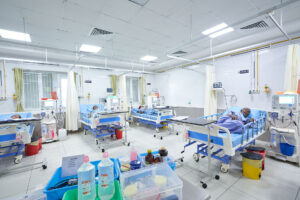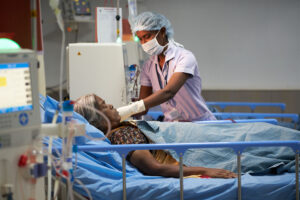“Studying the Invisibles”
The Department of Microbiology of VMCH & RI is well equipped to diagnose most of the infectious diseases prevalent in our society. The microbiology lab of Velammal Medical College Hospital was started in 2011. It started with basic serological and microbial culture tests. But now it performs a wide array of tests for detecting bacteria, viruses, fungi, and parasites with varied advanced and automated techniques. The scope of services has extended greatly thus providing round the clock microbiological support for the betterment of patient care.
The lab is managed by an efficient and dedicated team of medical microbiologists who regularly participate in academic teaching, research activities and continuing medical education to update their knowledge along with their routine diagnostic work. There is a team of well trained and dedicated microbiology technicians who perform proficient bench work. A computer-based hospital information system is used for managing patient samples from the stage of receiving and acknowledging the sample to reporting. All the lab reports are issued adhering to prescribed turn-around time. Critical reports are informed immediately to the concerned departments.
The Microbiology lab regularly participates in external quality assurance schemes run by reputed institutions/organizations (Bacteriology & Serology – CMC, Vellore; Mycology –PGI, Chandigarh) and has always fared exceptionally well in them (more than 90% scoring rate). It also has well monitored internal quality control measures to ensure high quality reliable diagnostic services. The lab also contributes significantly to hospital infection control activities on a regular basis. With very supportive management, the lab is growing day by day and improving its array of services.
Facilities available in the Department :
- 24X7 working lab with computer-generated reports
- Automated Blood And body fluids Culture System(BD BACTEC FX 40– 2 in number)
- VITEK -2 Compact system for MIC testing
- Anaerobic culture system
- LED Fluorescence Microscope (Under RNTCP)
- Automated Serological assays (Enhanced Chemiluminescence-Vitros 5600 & ECiQ)
- ELISA Reader and washer
- MOLBIO –Extraction and Amplification (Real-time PCR)
- Biosafety Cabinets– 3 in Number
- Laminar flow
- BOD incubator for Fungal culture
- Deep freezer (-20° C)–& Refrigerator to preserve biological materials
- Western blot equipment
- Binocular Microscope
- Incubator
- Hot air oven
- Horizontal and Vertical Autoclave for Sterilization
- Research Microscopy with photography unit
The Microbiology department has five main roles:
- Diagnostic laboratory services
- Environmental Surveillance
- Hospital Infection Control activities
- Teaching/ Academic activities
- Research activities
Diagnostic laboratory services :
The Microbiology laboratory is situated on the first floor of the hospital and has spacious and well equipped separate service laboratories for Serology, Bacteriology, Virology, Parasitology, Mycology, Mycobacteriology, and Molecular techniques. It also has sections dedicated to sterilization, washing and disinfection, media preparation, store, faculty room, etc.
It works 24 hours a day with prompt inoculation and processing of samples. The Microbiology lab runs over 1800 samples in bacteriology, 5000 tests in serology/immunology, 20 tests in mycology, 400 tests in mycobacteriology, 150 molecular tests every month on an average. The number of tests performed per day is steadily increasing with time.
The laboratory has facilities for bacterial culture and sensitivity (Conventional and Automated BD BACTEC FX40, VITEK 2 COMPACT SYSTEM for MIC testing), anaerobic culture, fungal culture, and sensitivity, Mycobacterial culture, several staining techniques for identification of important bacteria and fungi from various clinical samples.
Immuno-serological tests based on ELISA, Chemiluminescence assay (Vitros 5600 & ECiQ), Immunochromatography, Latex agglutination, and slide/tube agglutination are available for diagnosis of many viral and bacterial infections. Immunological parameters like CRP, ASO, RA also are performed. Supplementary test for HIV namely western blot is also carried out in our lab.
Facilities to diagnose varied parasitic infections from motion samples like stool wet mount for larva/ova/cyst, concentration techniques to yield a better result in stool wet mount, modified acid-fast staining for coccidian parasites are available. Malarial antigen detection from blood samples is also performed.
The Department of Microbiology has been recognized as Designated Microscopy Centre under RNTCP (Govt of India) and also performs immunofluorescence staining (LED Immunofluorescence Microscope) to diagnose TB. Our lab also is a part of the Integrated Counselling & Testing Centre (ICTC) in collaboration with NGOs (SAATHI) and contributes significantly to national programs.
The molecular section is equipped with Molbio truant –Real-time PCR to diagnose various bacterial and viral infections like TB diagnosis from both pulmonary & extrapulmonary samples, Rifampicin resistance detection, Hepatitis B & C virus qualitative and Quantitative detection, and Dengue.
The lab also provides data regarding communicable diseases that are being notified to concerned Government authorities on a regular basis.
Environmental Surveillance :
Department of Microbiology performs air and surface surveillance of operation theaters, intensive care units and other high-risk areas on a routine basis and as and when requested. Routine food and water surveillance are being done to ensure the quality of hospital supplies. Surveillance of food handlers for pathogenic bacteria and parasites is carried out to prevent transmission of foodborne diseases. The sterility of blood bags, instruments, and potency of disinfectants are tested. Disease outbreaks if any will be investigated thoroughly and appropriate control measures will be implemented.
Hospital Infection Control activities :
The quality of a hospitals’ infection control program reflects the overall standard of care provided by that institution. Good infection control programs reduce nosocomial infections, length of stay in the hospital, and costs associated with hospitalization. Nearly one- third of nosocomial infections can be prevented by a well- organized infection control program. Keeping this in mind, our Institute established a separate committee for Infection Control (HICC) in 2013.
Infection Control Programme includes the following components:
- Organized surveillance and control activities for Hospital Acquired Infections (HAI).
- Control of infectious disease outbreaks.
- Protection of employees from infection –Vaccination & Post-exposure prophylaxis treatment.
- A system for reporting back to the clinicians.
- CSSD, Linen & Laundry protocol auditing
- Auditing of hand hygiene, Biomedical waste adherence of all health care workers in the high-risk area.
- Continuing education of medical staff.
- Advice on new products, devices, and procedures pertinent to infection control.
HICC meeting is convened once every 2 months and matters pertaining to infection control activities are discussed and implemented. The meeting will be headed by Chairperson (Dean/MS from the administrative side; HOD Microbiology from Department side), Infection control officer and Members include representative doctors from medical and surgical specialties and also from ancillary departments like CSSD, OT, Nursing, Pharmacy, Housekeeping, and Maintenance. In view of expanding the needs of the hospital, a dedicated ICN was appointed to carry out infection control activities since mid-2016. The dedicated infection control team (HICT) is working on the quality improvement of the hospital on a day to day basis. HICC has developed the antibiotic policy exclusively for our institute and on the verge of implementing to all area of our hospital.
1. Ramesh. A. Neutrophil dysfunction in diabetes. Review.The Antiseptic Sep2014 Vol 111 No 9 Page 22-28.
2. Thilakavathy P, Ramesh A, Anand Janagond, Jeremiah SS, Vijaykumar GS Awareness on Biomedical waste management practices among healthcare workers in a tertiary care hospital. The Antiseptic Nov2014 Vol 111 No 11 Page 10-12.
3. Ramesh A, Anand Janagond, Vijaykumar GS. Infection-related to climate change and possible solutions. Scholars journal of applied medical sciences.2015;3(2G);1011-1017
4. P Thilagavathy, GS Vijaykumar, A Ramesh, Anand Janagond, T Rajendran, SS Jeremiah, G Vithiya. Methicillin-resistant Staphylococcus aureus nasal carriage among health care workers: Decolonization and follow up study conducted in a tertiary care hospital. Journal of Human Health.Jan-Apr 2015 Vol 1 Issue 1 Page 16-19.
5. Jhansi Charles, A Ramesh, Anand Janagond, T Rajendran, P Thilagavathy, G Vithiya. Study of prevalence of Dengue infection in a rurally situated tertiary medical college hospital in Madurai. IOSR Journal of Dental and Medical Sciences (IOSR-JDMS) Volume 14, Issue 10Ver.V(Oct. 2015), PP 32-36
6. Vithiya Ganesan, Gowdara Shankarappa Vijay Kumar, Shunmuga Sundaram Ponnusamy1 Candida Endocarditis: The Insidious Killer Journal of Global Infectious Diseases / Jan-Mar 2015 / Vol-7 / Issue-1
7. G. Vithiya, T. Rajendran, Mariappan, Hemant Kumar Tubercular prostate abscess in an immunocompetent patient I n d I a n j o u rnal of t u b e r c u l os is 6 2 ( 2 0 1 5 ) 1 1 0 e1 1 3
8. Jhansi Charles, Anand Janagond, Thilagavathy, Rajendran, Ramesh, Vithiya. Evaluation By OSPE(Objective Structured Practical Examination)–A Good Tool For Assessment Of Medical Undergraduates –A Study Report From Velammal Medical College, Madurai, Tamilnadu, India. Journal of Research & Method in Education (IOSR-JRME) Volume 6, Issue 3Ver. II(May. -Jun. 2016), PP 01-06
9. Vijaykumar GS, Thilakavathy P, Jeremiah SS, Vithiya G. Osteomyelitis of Humerus and Intramuscular Abscess Due to Melioidosis. Kathmandu Univ Med J 2016;54(2):184-5.
10. Anand Bhimaray Janagond, Rajendran T, SurjeetAcharya, VithiyaG, Ramesh A, Jhansi Charles. The spectrum of Dermatophytes Causing Tinea Corporis and Possible Risk Factors in Rural Patients of Madurai Region, South India. National Journal of Laboratory Medicine. 2016 Oct, Vol-5(4): MO29-MO32
11. Vithiya Ganesan, Shunmuga Sundaram Ponnusamy and Raja Sundaramurthy Fungal endocarditis in pediatrics: a review of 192 cases (1971–2016) Cardiology in the Young Published online: 27 March 2017
12. Ramesh Arunagiri, Raja Sundaramurthy, Arunkumar Vishwanathan, Vithiya Ganesan, Rajendran Tiruvannamalai Clinicomicrbiological profile and antibiotic resistance analysis of Diabetic foot ulcer from a tertiary care hospital.J.Evolution Med.Dent.Sci. 2017;6(71):00-00,DOI:10.14260/jemds/2017/0000
13. Dr.Jhansi Charles, Dr. Rajendran, Dr.Vithiya, Dr.Ramesh Study on the prevalence of imipenem resistant Acinetobacter species in a tertiary care hospital at Madurai. IOSR Journal of Dental and Medical Sciences (IOSR-JDMS) Volume 16, Issue 11Ver.XII(Nov. 2017), PP 37-41
14. Raja Sundaramurthy, Ramesh Arunagiri, Vithiya Ganesan, Sethuammal Perumal, Rajendran Tiruvannamalai, Jhansi Charles. Seroprevalence of transfusion transmissible infections among blood donors by chemiluminescent assay in a tertiary care center. J Infect Dev Ctries 2018; 12(1):031-036. DOI:10.3855/jidc.9430.
Ongoing Projects:
We are conducting CME every year in the name of VIEWS. The department is all set to conduct ISA Sponsorship in 2020



